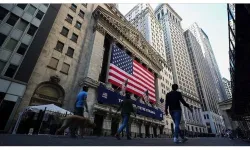Despite the recession that has been looming since last year, the US economy remains resilient and is growing above expectations. Nevertheless, analysts and investors want to have a prediction about how the US economy will progress and focus on almost every data, including the course of demand for French fries.
It is recognised that stable demand for French fries is good news for the US economy.
French fry addition rate above pre-pandemic levels
Consumers are still spending money on fries with their meals, and that could mean a positive reading for the economy, Cnbc's Alex Harring reports.
Tom Werner, chief executive of frozen potato supplier Lamb Weston Holdings, told analysts in the company's earnings call on Thursday that he sees the share of consumers ordering frozen fast food meals with the side known as the fry addition rate remaining above pre-pandemic levels. This could be an indication of a resilient consumer even at a time when inflation is squeezing pockets and recession fears are growing.
"The global frozen potato category remains strong, with overall demand and supply balanced. The add fries rate - the proportion of consumers ordering French fries when visiting a restaurant or other foodservice outlet in our key markets - remains largely stable and above pre-pandemic levels," said Werner.
Financial pressure and spending cuts
When consumers feel financial pressure, a natural reaction is to try to reduce their spending through measures such as switching to cheaper brands or cutting back on unnecessary expenditure. In the case of Lamb Weston and fast-food companies, this can manifest itself in customers opting to skip fries or other additional orders in order to keep spending down.
Of course, the impact of inflation can also affect the business beyond short-term sales. Lamb Weston is seeing little change in overall traffic in key US markets, but there is evidence of a shift in consumer behaviour. Accordingly, growth in quick-service food providers, which are generally more affordable, is offsetting declines in full-service and casual dining restaurants.
Werner also said that inflation could continue to push up the company's costs, particularly in relation to potato contract prices, and pointed to June as the source of the weakness in restaurant traffic seen in the fiscal fourth quarter. However, Werner remains confident that the company's potato supply can weather the economic slowdown, noting that it is reassuring to see trends improving since then.
No change expected in restaurant traffic trends
"We do not expect restaurant traffic trends to change significantly in the near term as high interest rates, high inflation and uncertainty continue to impact the consumer. However, demand for frozen potatoes has proven resilient during the most challenging economic periods and we remain confident in the long-term growth prospects for the global category," Mr Werner said.
Lamb Weston shares rose more than 9 per cent in yesterday's session. The stock has performed almost in line with the broader market, up almost 11 per cent since the start of the year in 2023.
The future of the US economy is hidden in French fries
Since last year, the world has been focussing on whether the US economy will enter a recession. According to one view, the demand for 'French fries' contains data that can satisfy this curiosity.
Editor: Albert Owen
Trending news

Hells Angels and Venezuelan Gangs: Fact-Checking the Viral Claim About Aurora, Colorado

Deadly Russian Strike Hits Lviv, Ukraine: President Zelenskyy Reports Latest Missile Barrage

Fantasy Football Rankings 2024: Breakout Predictions from Top NFL Model That Forecasted Jahmyr Gibbs’ Big Year

1700 new virus species discovered in the Himalaya

Sydney McLaughlin-Levrone Opens Up About Reactions to Her World Record Performance and the Personal Impact

Police Address Concerns Over Hells Angels Motorcycle Club’s Alleged Move to Aurora









